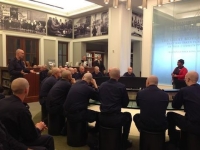Police and Librarians, Working on Civil Society
Nashville Public Library, Tenn.
Innovation Synopsis
Challenge/Opportunity
We teach local police recruits about Nashville’s Civil Rights legacy, facilitating conversations about how this history might impact their work today. Our work with Metro Police is the latest in our “public living room project.” We use our Civil Rights Room and Collection as an educational backdrop every day. We use oral histories, photos, and more to provide context and facilitate discussions about complex community dynamics. The Library has poured years of work and millions of dollars into developing our Civil Rights Room and Collection, which provides a safe, engaging space for civil society discourse.
Key Elements of Innovation
The Library developed a “Civil Rights in a Civil Society” curriculum, which quickly got the attention of Metro Police leaders. They send police recruits and others to sit at our mock lunch counter, similar to where peaceful protestors sat in to protest local segregation. Librarians take participants through primary sources from our collection — photos, documents, and Civil Rights oral histories — which provide context for analysis. Participants discuss how this history impacts their perceptions of culture, biases, and conflict. During training, a community is created among participants — one built on vulnerability, curiosity, listening, engaged conversation, and education.
Achieved Outcomes
Since our first training for 60 recruits, we have now trained 574 law enforcement officials, including two classes of recruits, active police officers and supervisors, and agents from the Tennessee Bureau of Investigation. With a newly awarded grant of $25,000 from the Nissan Foundation, the Library can now expand this project, taking it on the road to reach even more agencies, companies, and neighbors in our community, as well as other cities and libraries across the U.S. so they can be equipped to facilitate these conversations in their own communities.

